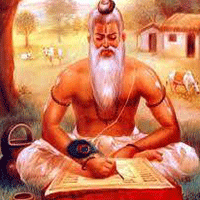Baudhāyana
Baudhayana (800 BC – 740 BC) is said to be the original Mathematician behind the Pythagoras theorem. Pythagoras’ theorem was indeed known much before Pythagoras, and it was Indians who discovered it at least 1000 years before Pythagoras was born! The credit for authoring the earliest Sulba Sutras goes to him.
Baudhayan was the first one ever to arrive at several concepts in Mathematics, which were later rediscovered by the western world. The value of pi was first calculated by him. As you know, pi is useful in calculating the area and circumference of a circle. What is known as Pythagoras theorem today is already found in Baudhayan’s Sulva Sutra, which was written several years before the age of Pythagoras.
To write a biography of Baudhayana is essentially impossible since nothing is known of him except that he was the author of one of the earliest Sulbasutras. We do not know his dates accurately enough to even guess at a life span for him, which is why we have given the same approximate birth year as death year.
He was neither a mathematician in the sense that we would understand it today, nor a scribe who simply copied manuscripts like Ahmes. He would certainly have been a man of very considerable learning but probably not interested in mathematics for its own sake, merely interested in using it for religious purposes. Undoubtedly he wrote the Sulbasutra to provide rules for religious rites and it would appear an almost certainty that Baudhayana himself would be a Vedic priest.It is widely believed that he was also a priest and an architect of very high standards. It is possible that Baudhayana’s interest in Mathematical calculations stemmed more from his work in religious matters than a keenness for mathematics as a subject itself. Undoubtedly he wrote the Sulbasutra to provide rules for religious rites, and it would appear almost certain that Baudhayana himself would be a Vedic priest.
The Sulbasutras is like a guide to the Vedas which formulate rules for constructing altars. In other words, they provide techniques to solve mathematical problems effortlessly.
If a ritual was to be successful, then the altar had to conform to very precise measurements. Therefore mathematical calculations needed to be precise with no room for error.
People made sacrifices to their gods for the fulfilment of their wishes. As these rituals were meant to please the Gods, it was imperative that everything had to be done with precision. It would not be incorrect to say that Baudhayana’s work on Mathematics was to ensure there would be no miscalculations in the religious rituals.
The mathematics given in the Sulbasutras is there to enable the accurate construction of altars needed for sacrifices. It is clear from the writing that Baudhayana, as well as being a priest, must have been a skilled craftsman. He must have been himself skilled in the practical use of the mathematics he described as a craftsman who himself constructed sacrificial altars of the highest quality.The Baudhāyana sūtras (Sanskrit: बौधायन) are a group of Vedic Sanskrit texts which cover dharma, daily ritual, mathematics and is one of the oldest Dharma-related texts of Hinduism that have survived into the modern age from the 1st-millennium BCE. They belong to the Taittiriya branch of the Krishna Yajurveda school and are among the earliest texts of the genre.
The Baudhayana sūtras consist of six texts:
the Śrautasûtra, probably in 19 Praśnas (questions),
the Karmāntasûtra in 20 Adhyāyas (chapters),
the Dvaidhasûtra in 4 Praśnas,
the Grihyasutra in 4 Praśnas,
the Dharmasûtra in 4 Praśnas and
the Śulbasûtra in 3 Adhyāyas.
The Baudhāyana Śulbasûtra is noted for containing several early mathematical results, including an approximation of the square root of 2 and the statement of the Pythagorean theorem.
The first book is primarily devoted to the student and deals in topics related to studentship. It also refers to social classes, the role of the king, marriage, and suspension of Vedic recitation. Book two refers to penances, inheritance, women, householder, orders of life, ancestral offerings. Book three refers to holy householders, forest hermit and penances. Book four primarily refers to the yogic practices and penances along with offences regarding marriage.

Baudhāyana
Proffession: Mathematician
Nationality: India


